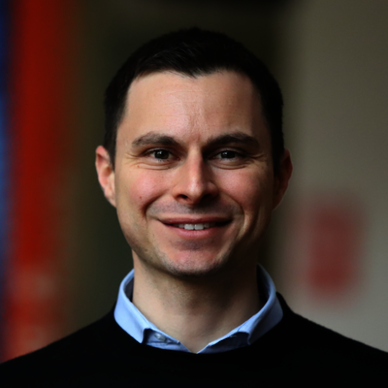Keynotes and Tutorials
AIxIA 2022 comes with a great program of invited talks and tutorials. Refer to the Program Overview page to look for the time slots. All the keynotes and tutorials will take place in the Plenary room.
Keynotes

Symbols as a Lingua Franca for Supporting Human-AI Interaction
For Explainable and Advisable AI Systems
Subbarao Kambhampati
(Arizona State University)
Wednesday 30th November
KT 3 - 9:00
Plenary room
Keynote
Despite the surprising power of many modern AI systems that often learn their own representations, there is significant discontent about their inscrutability and the attendant problems in their ability to interact with humans. While alternatives such as neuro-symbolic approaches have been proposed, there is a lack of consensus on what they are about. There are often two independent motivations (i) symbols as a lingua franca for human-AI interaction and (ii) symbols as system-produced abstractions used by the AI system in its internal reasoning. The jury is still out on whether AI systems will need to use symbols in their internal reasoning to achieve general intelligence capabilities. Whatever the answer there is, the need for (human-understandable) symbols in human-AI interaction seems quite compelling. In particular, humans would be interested in providing explicit (symbolic) knowledge and advice -- and expect machine explanations in kind. This alone requires AI systems to maintain a symbolic interface for interaction with humans. In this talk, I will motivate this point of view, and describe recent efforts in our research group along this direction.
Short bio: Subbarao Kambhampati is a professor of computer science at Arizona State University. Kambhampati studies fundamental problems in planning and decision making, motivated in particular by the challenges of human-aware AI systems. He is a fellow of Association for the Advancement of Artificial Intelligence, American Association for the Advancement of Science, and Association for Computing machinery, and was an NSF Young Investigator. He served as the president of the Association for the Advancement of Artificial Intelligence, a trustee of the International Joint Conference on Artificial Intelligence, the chair of AAAS Section T (Information, Communication and Computation), and a founding board member of Partnership on AI.
Kambhampati’s research as well as his views on the progress and societal impacts of AI have been featured in multiple national and international media outlets.
He can be followed on Twitter (@rao2z).

My adventures with Datalog: Walking the thin line between
theory and practice
Georg Gottlob
(University of Oxford)
Thursday 1st December
KT 4 - 12:00
Plenary room
Keynote
I have worked on various subjects, but ever since my years as PostDoc, I have been fascinated by Datalog, a logical programming language for reasoning and database querying. I wil start this talk with a short introduction to Datalog, followed by an overview of some theoretical results on a number of Datalog variants. This will be interleaved with a tale of four Datalog-related companies I co-founded: DLVSystem, Lixto, Wrapidity, and DeepReason.ai. I will also comment on the difficulties an academic has to face when spinning out a start-up, and on the satisfaction you may experience when your results are used in practice.
Short Bio: Georg Gottlob is a Royal Society Research Professor and a Professor of Informatics at Oxford University, and an Adjunct Professor at TU Wien. At Oxford he is a Fellow of St John's College. His interests include knowledge representation, logic and complexity, and database and Web querying. He has received various awards, among which the Wittgenstein Award (Austria) and the Ada Lovelace Medal (UK), and, jointly with co-authors the Alonzo Church Award. He is a Fellow of the Royal Society, of the Austrian and German National Academies of Science, and of the Academia Europaea. He was a founder of Lixto, a company specialised in semi-automatic web data extraction which was acquired by McKinsey in 2013. Gottlob was awarded an ERC Advanced Investigator's Grant for the project "DIADEM: Domain-centric Intelligent Automated Data Extraction Methodology". Based on the results of this project, he co-founded Wrapidity Ltd, a company that specialised in fully automated web data extraction, which was acquired in 2016 by Meltwater. He was also a co-founder of the currently active company DLVSystem and of DeepReason.AI Ltd, which is a second recently acquired by Meltwater.
Tutorials

End-to-end constrained optimization learning
Ferdinando Fioretto
(Syracuse University, NY)
Monday 28th November
KT 1 - 14:00
Plenary room
Tutorial
This tutorial reviews the recent advancements made in using constrained optimization to incorporate structural information and domain knowledge into machine learning models. We start by reviewing the foundation of differentiable optimization and discuss how to convert optimization into differentiable layers to use in machine learning models. Such integration enables to enforce structural information and domain knowledge into machine learning models. Next, we focus on extending this setting by integrating constrained optimization to enforce structure in the outputs of learned embeddings, leading to end-to-end decision-focused learning, that trains models to directly optimize the performance in targeted applications. Finally. we review techniques to learn constrained optimization surrogates by leveraging a distribution of optimization problems and their solutions leading to enhanced optimization modeling technology for operations research decision tasks. The tutorial concludes with a discussion of challenges and open questions.
Speaker bio: Ferdinando Fioretto is an assistant professor at Syracuse University, NY. He works on machine learning, optimization, differential privacy, and fairness. His recent work focuses on (1) the integration of constrained optimization and machine learning to enhance the expressive ability of machine learning models and (2) understanding the interplay among privacy, equity, robustness, and performance in machine learning models and decision tasks. He is a recipient of the 2023 Amazon Research Award, 2022 NSF CAREER award, the 2022 Google Research Scholar Award, the 2022 Caspar Bowden PET award, the 2021 ISSNAF Mario Gerla Young Investigator Award, the 2021 ACP Early Career Researcher Award, the 2017 AIxIA Best AI dissertation award, and several best paper awards.

Cognitive Design for Artificial Minds
Antonio Lieto
(University of Turin)
Tuesday 29th November
KT 2 - 14:00
Plenary room
Tutorial
In the last decades, the research in Artificial Intelligence (AI) has reached remarkable results in a variety of fields ranging from computer vision to language technologies. Despite these results, however, the realization of artificial systems endowed with human-level competencies in real-life scenarios is still far from being achieved and, in general, the gap between natural and artificial intelligence is still enormous. Given this state of affairs, in recent years, the area of cognitively inspired artificial systems has attracted a renewed attention, both from academia and industry, and the awareness about the need for additional research in this interdisciplinary intersection is gaining widespread acceptance. In this tutorial, I will show how the insights coming from the cognitive research can be used to shape the design of intelligent artificial systems with the twofold goal of i) building better (i.e. more intelligent) machines and ii) detecting and discovering, via simulation, novel aspects and mechanisms of the biological system taken as a source of inspiration.
Short bio: Antonio Lieto is a researcher in Computer Science at the Department of Computer Science of the University of Turin (Italy) and at the ICAR-CNR Institute in Palermo (Italy). His main research topics include commonsense reasoning, language and knowledge technologies, cognitive architectures for intelligent interactive agents (embodied and not). He is the current Vice-President of the Italian Association of Cognitive Sciences (AISC, 2017-2022), the recipient of the “Outstanding BICA Research Award” from the Biologically Inspired Cognitive Architecture Society (USA), and is an ACM Distinguished Speaker on the topics of cognitively inspired AI. He has authored the book “Cognitive Design for Artificial Minds” (Routledge/Taylor & Francis, 2021).



Quantum computing and planning
Angelo Oddi1, Riccardo Rasconi1, Marco Baioletti2
(1CNR-ISTC, Rome and 2University of Perugia)
Friday 2 december
KT 5 - 9:00
Plenary room
Tutorial
Quantum Computing represents the next big step towards speed boost in computation, which promises major breakthroughs in several disciplines including Artificial Intelligence for the resolution of important classes of problems. Quantum algorithms process information represented as qubits, the basic memory unit of quantum processors, and quantum operations (called gates) are the building blocks of quantum algorithms. In order to be run on quantum computing hardware, quantum algorithms must be compiled into a set of elementary machine instructions (i.e., quantum gates). Since currently available quantum circuits suffer a number of technological problems such as noise and decoherence, it is important that the process that carries out the quantum computation be somehow adapted to the physical limitations of the quantum hardware of interest, by means of a proper compilation. This is the point in which Heuristic-based Planning & Scheduling techniques as well as Evolutionary algorithms can be of help to produce efficient compilation plans. On the other side, the speed-up promised by quantum technology may be greatly beneficial to solve AI tasks of more and more realistic size.
Short bios:
Angelo Oddi [M.S. Electronic Engineering 1993, Ph.D. Medical Computer Science 1997] is a Senior Researcher of the Institute of Cognitive Sciences and Technologies of the Italian National Research Council (ISTC-CNR). His research work focuses on Artificial Intelligence (AI), in particular planning & scheduling, constraint-based reasoning, learning, quantum circuit compilation, and the design of autonomous systems for real-world applications. He has published more than 70 papers, both in journals, books and peer-reviewed international AI conferences. He participated and coordinated several national and international projects, many of them funded by the European Space Agency (ESA); he recently held the position of head of the study "Meta-Heuristic Algorithms for the Quantum Circuit Compilation Problem" funded by the ESA Ariadna program.
Marco Baioletti [M.S. Mathematics 1990, Ph.D. Statistical and Mathematical Methods for Economical and Social Research 1996] is an assistant professor at the University of Perugia since 2004. His research interests are focused on some areas of Artificial Intelligence (AI), in particular automated planning, probabilistic modelling and reasoning, metaheuristics for combinatorial optimization, neuro-evolution, quantum circuit compilation, quantum annealing.
Riccardo Rasconi [M.S. Electronic Engineering 2003, Ph.D. Information and Communication Sciences and Technologies 2007] is a Research Scientist at ISTC-CNR. His research interests in AI span from heuristic-based combinatorial optimization, constraint reasoning, automated and energy-aware planning and scheduling, reinforcement learning techniques to extend the autonomy capabilities of a robotic agents, and Quantum Compilation. He has participated to the study funded by the Ariadna program of the ESA "Meta-Heuristic Algorithms for the Quantum Circuit Compilation Problem".

